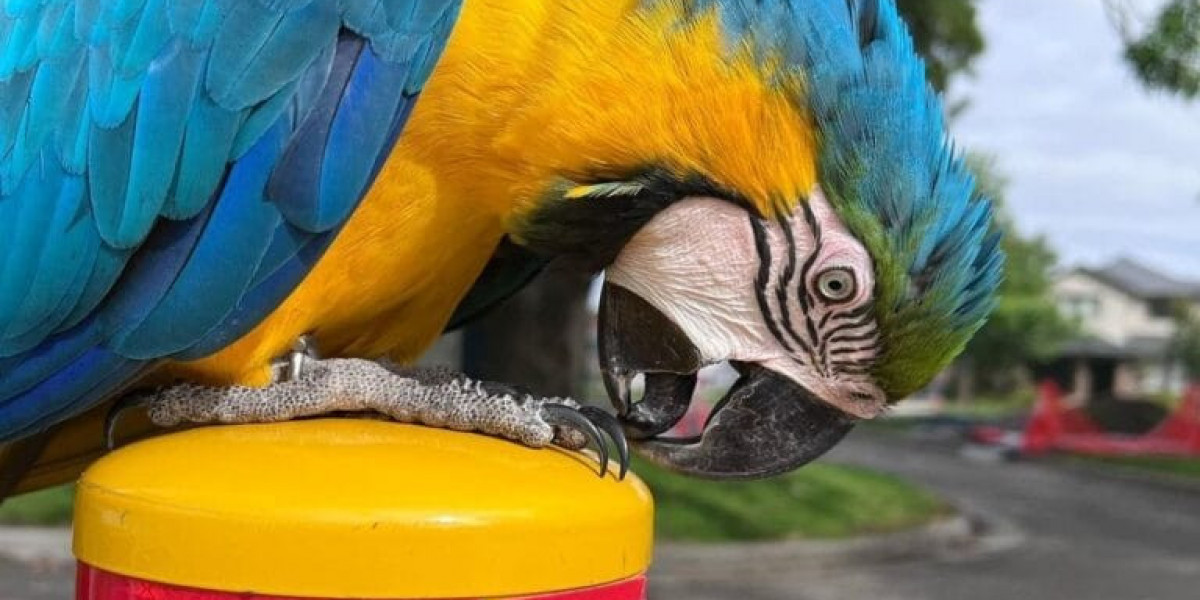Macaws, with their vibrant plumage, striking beauty, and intelligent personalities, are among the most desirable pet birds in the world. These large parrots, native to Central and South America, can bring immense joy and color to your home. However, buying and caring for a macaw is a significant commitment that requires careful consideration and preparation. This guide will walk you through the key aspects of owning a macaw, from choosing the right bird to ensuring its long-term well-being.

1. Understanding Macaws
Macaws are part of the parrot family and are known for their large size, strong beaks, and long tails. They are highly social and intelligent birds, capable of forming deep bonds with their human caregivers. Macaws can live for 30 to 50 years, and some species can even reach 60 years or more. This long lifespan means that owning a macaw is a lifelong commitment.
There are several species of macaws, including the Blue-and-Gold Macaw, the Green-Winged Macaw, the Hyacinth Macaw, and the Scarlet Macaw. Each species has its own unique characteristics, so it's important to research and choose one that fits your lifestyle and preferences.

2. Why Buy a Macaw?
- Companionship: Macaws are known for their affectionate and loyal nature. They can form strong bonds with their owners and become a devoted companion.
- Beauty and Color: With their brilliant feathers, macaws are a visual delight. They can brighten up any room and are a stunning addition to any home.
- Intelligence: Macaws are highly intelligent and can be trained to perform a variety of tricks and behaviors. They can also learn to mimic human speech, making them a fun and engaging pet.
- Conversation: Macaws are vocal birds and can learn to mimic human speech and other sounds. This can lead to hours of entertaining and interactive conversations with your pet.
3. Preparing for a Macaw
Before you bring a macaw home, it's essential to prepare your living space and understand the responsibilities that come with macaw ownership.
- Cage: Macaws need a large, sturdy cage that provides ample space for movement and play. The cage should be at least 36 inches wide, 48 inches tall, and 24 inches deep. It should have horizontal bars for climbing and perches of varying sizes and textures.
- Diet: Macaws require a balanced diet that includes high-quality pelleted food, fresh fruits and vegetables, and occasional nuts and seeds. They also benefit from a variety of foods to keep them mentally stimulated.
- Exercise and Play: Macaws are active birds and need daily exercise and playtime outside their cage. They should have access to a safe, bird-proofed area where they can fly and explore.
- Socialization: Macaws are highly social and need regular interaction with their human caregivers. They can become depressed and bored if left alone for long periods, so ensure you have the time and energy to spend with your bird.
- Veterinary Care: Find an experienced avian veterinarian before bringing your macaw home. Regular check-ups and prompt medical attention are crucial for maintaining your bird's health.
4. Where to Buy a Macaw
- Reputable Breeders: Look for a reputable breeder who focuses on the health and well-being of their birds. A good breeder will be knowledgeable about macaw care and will provide a health guarantee.
- Rescues and Adoption Centers: Consider adopting a macaw from a rescue organization. Many macaws are in need of new homes due to various reasons, and adopting can be a rewarding way to give a bird a second chance.
- Pet Stores: Some pet stores may sell macaws, but it's important to ensure that the store has a good reputation and provides proper care for their birds. It's often better to buy directly from a breeder or adopt from a rescue.
5. Caring for Your Macaw
- Daily Care: Clean the cage daily, provide fresh food and water, and ensure the bird has enough time outside the cage for exercise and socialization.
- Enrichment: Macaws are intelligent and need mental stimulation. Provide a variety of toys, puzzles, and activities to keep your bird entertained and mentally healthy.
- Training: Start training your macaw from a young age. Basic commands like "step up" and "step down" are essential, and you can gradually introduce more complex tricks and behaviors.
- Health Monitoring: Keep an eye on your macaw's health. Common issues include respiratory infections, feather plucking, and nutritional deficiencies. Regular vet check-ups can help catch and treat these issues early.
6. Common Challenges
- Noise Level: Macaws are vocal birds and can be quite loud, especially in the morning and evening. If you live in a quiet neighborhood or have noise-sensitive neighbors, this might be a concern.
- Biting and Aggression: Macaws can be territorial and may bite if they feel threatened or overstimulated. Proper training and socialization can help manage this behavior.
- Cost: Macaws are expensive birds, and their care can be costly. Consider the financial commitment before making a decision.
7. Ethical Considerations
- Wild Birds: It's important to avoid buying wild-caught macaws, as this can contribute to the decline of wild populations. Always buy from a breeder or adopt from a rescue.
- Conservation: Many macaw species are endangered in the wild due to habitat loss and illegal trafficking. By supporting responsible breeding and adoption, you can help contribute to conservation efforts.
8. Conclusion
Owning a Macaw Training is a rewarding but challenging experience. These beautiful and intelligent birds can bring joy and color to your life, but they require significant care and attention. If you're prepared to meet the needs of a macaw and can commit to a long-term relationship, then bringing one into your home can be a truly enriching experience.
If you're considering buying a macaw, take the time to research, prepare, and choose the right bird for you. With the right care and a loving home, your macaw can thrive and be a beloved member of your family for many years to come.








